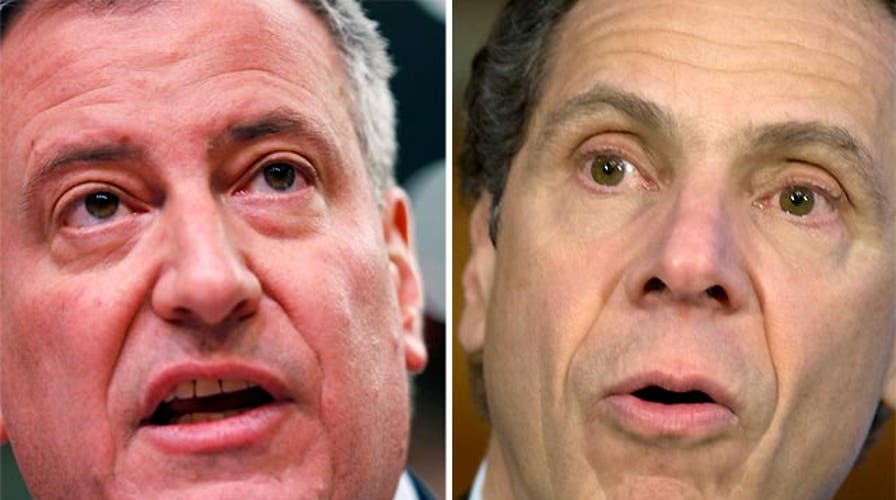Voters knew Bill de Blasio would be turning the Big Apple into a test tube for liberal policies. But New York City's new mayor is moving surprisingly quickly as he pushes for changes that would give ID cards to illegal immigrants, hike taxes on top earners and raise the city's minimum wage.
The unabashed "progressive" who ran and won on promises to end New York's income inequality is now running into pushback from members of his own party, including the state's Democratic governor, Andrew Cuomo.
The governor already has rejected two of de Blasio's pet projects, and used choice words to describe one of them. This week, he panned the mayor's push to raise taxes on the wealthy in order to fund a New York City pre-K program. Cuomo, who wants a statewide program, called the idea of letting "richer communities" fund only their own districts "repugnant."
While the de Blasio-Cuomo spat has captured the attention of the New York media, de Blasio's debut as mayor speaks to a broader concern.
Some political watchers warn that de Blasio, who captured 73 percent of the vote during November's general election, is blowing through his political capital and is now in jeopardy of becoming the latest in a long line of New York City mayors who have floated grand ideas only to have them knocked down and defeated in Albany.
In one of his most ambitious ventures -- whose fate is yet to be seen -- de Blasio in his State of the City address earlier this week promised to make good on a campaign pledge to make municipal ID cards available to all New York City residents in 2014. They would be issued regardless of immigration status, "so that no daughter or son of our city goes without bank accounts, leases, library cards, simply because they lack identification."
That's not sitting well with some who are calling de Blasio's plan a security concern that rewards illegal immigrants living in New York City.
"It's a terrible idea," Republican strategist Brad Blakeman told Fox News. Blakeman said he's "appalled" that de Blasio "would be so callous as to open up the city to legitimize illegal citizens."
Others disagree.
"What it does is that it brings people out of the woodwork and brings people into the system," Emily Tisch Sussman, campaign director for the Center for American Progress Action Fund, told Fox News. "Even those who have strong homeland security concerns. This is right in line with them. Bring (illegal immigrants) into the system. Give them a checkpoint."
Sussman believes the IDs "provide an opportunity for people who are undocumented and living in the city. Start to access bank accounts, get doctor's appointments."
In the absence of federal immigration reform, other cities, and states, have taken the immigration issue into their own hands with various degrees of success. While states like Alabama and Georgia have strengthened their laws, municipalities in Connecticut, Colorado and California have softened theirs.
Meanwhile, de Blasio's push for a higher minimum wage and higher tax on top earners is getting an icy reception in Albany.
The new mayor said in his State of the City address he'd request permission from the state legislature to raise the minimum wage in his city. He did not specify how much he wanted to raise the per-hour pay, but Cuomo was immediately skeptical.
In 2013, though, Cuomo and New York lawmakers agreed to raise the state's minimum wage to $9 by the end of 2015. During the State of the Union address last month, President Obama called for the federal wage to be raised to $10 from $7.25.
But de Blasio's biggest call to change involves raising taxes on New Yorkers making more than $500,000 a year to pay for pre-kindergarten programs.
"Raising taxes on the rich makes our commitment to our kids more than just words," de Blasio said in his address.
His words, though, landed with a thud with Albany lawmakers who must approve any tax hike before it can be implemented. The mayor's agenda also didn't sit well with Cuomo who spoke out against the policy proposal less than 24 hours after de Blasio announced it.
During an interview on the public radio program "The Capitol Pressroom," Cuomo argued that allowing local governments to set their own tax rates would create a "chaotic situation" pitting cities against each other.
But one subject where the two could come to a compromise is on charter schools.
Once a strident opponent against them, de Blasio has been forced to soften his stance. His push to provide pre-K classes for the city's 4-year-olds has him turning to Cuomo's education panel which recently recommended that state lawmakers start allowing existing charter schools to offer pre-K classes.
"There is untapped potential to increase access to prekindergarten in high-need communities through public charter schools," a report by the panel said.





